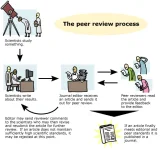Clearly you don't understand the process. When you publish a paper, your goal is to have it published in a peer reviewed journal. You submit your manuscript to the journal, and are assigned a number of anonymous peers who read and criticize your paper. This is what's typically referred to as "peer-review." Your paper might get rejected outright. It may be accepted as is. But the most likely outcome is that you are forced to make a number of changes, rework analyses, restate assumptions, correct conclusions, etc. before they will accept and publish your paper.Bingo. He's criticizing the very first step in the process of peer review - publication!
Yes, peer review doesn't stop there. it will get further scrutinized after it's published, but publication is NOT the very first step in the process of peer review.


